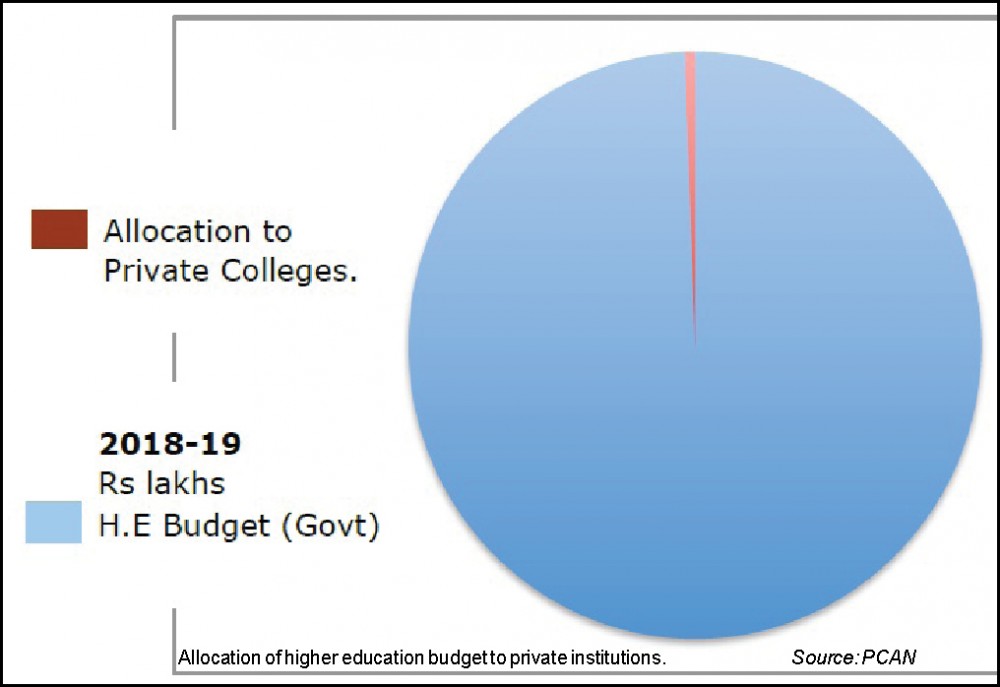Budget Allocation for Higher Education in 2018-19

Dimapur, July 15 (MExN): The Private College Association Nagaland (PCAN) on Wednesday submitted a representation to the Chief Minister of Nagaland suggesting a paradigm shift in the state’s education policy in order to mitigate the impact of COVID-19 on private colleges.
In the letter, PCAN President Dr PS Lorin and General Secretary Vezuhu Keyho stated that educational institutions in Nagaland have done “exceptionally well,” to adjust themselves to the “new normal” of online learning. However, the “new normal” is expected to go on with both physical traditional classes and online mode, it said while drawing attention to a number of concerns with regard to private colleges in the state.
Among others, PCAN requested that the Core Group for Economic Affairs set up by the Government to consider the’ dire situation and needs’ of the 44 private colleges of Nagaland while working out strategies and action plans for strengthening the state economy.
Stating that the private colleges cater to about 23,600 students as opposed to 7,400 in 15 government colleges out of the total 31,000 students during 2018-19 in the state, it also put across that the private colleges employ about 1,090 teachers and 640 staff, who are now facing great challenges presented by the pandemic.
As such it requested the Chief Minister to “intervene and grant a special financial stimulus to the private colleges, and also meaningfully enhance the annual grant-in-aid,” so that the colleges can offer fee concessions to students and maintain full pay and salary to our faculty and staff.
“Without a special financial dispensation from the State Government, since our revenue has stopped, we just do not have the liquidity to pay our faculty and staff,” the letter read.
The PCAN meanwhile said that with the institutions venturing into “tech and media friendly mode,” internet facilities should be upgraded even in the remote areas to ensure that institutions function without interruption. For this up-gradation we request the Government to act without delay, the letter stated.
With regard to long term impact on education, the PCAN urged the State Government and concerned departments to strategize their vision statements, planning and policy decisions to overhaul and upgrade the existing systems.
A common vision
Stating that the State Government and the PCAN share a common vision to make Nagaland an educational hub, it pointed out that only one or two government colleges offer undergraduate commerce studies and not a single government college offers management studies. In this regard, it said that the private colleges have stepped in to bridge the gap, with much financial burden.
Given the background, the private colleges should be taken as a strategic partner by the State Government, it said while offering services and facilities to partner with both Central and State Government for up-gradation of all round development of Higher Education in the state. “For this, we are looking for the State Government to take a leading role.”
‘Private colleges grossly underfunded’
Dimapur, July 15 (MExN): Private colleges in Nagaland account for 76% of students in the higher education, but they are grossly underfunded by the government, the PCAN stated in a letter to the Chief Minister.
The imbalance and disparity in funding of government and private “is all too glaring and unjust,” PCAN argued, highlighting the funding pattern over the years.
It pointed out that the Higher Education (HE) budget during 2018-19 was Rs 113.01 crore; out of which the allocation to private colleges was just Rs 0.64 crore, constituting a meager 0.57% of the total budget.
Data provided by PCAN highlighted that the State’s Government Grant-in-Aid to private colleges since 2016-17 below 1% of the total budget. There is no significant change during 2019-20, it added.
In this regard, PCAN contended that private colleges are “surviving” only because the students and parents “perceive the private colleges as providing quality education,” while adding that the drop-out rate in the private colleges are also much lower, than that of government colleges.
Further, the Association claimed that the private colleges in Nagaland charge “amongst one of the lowest fees in the country,” and are still expected to provide fee concessions at the expense of its employees. In this regard, it appealed the State Government for “one-time financial assistance” to compensate the loss during the pandemic while suggesting that fee reimbursement for students or some other “creative solution” can be adopted.
It also suggested the State Government to extend a special package in terms of one time grants/assistance of 30 to 50% of students' fees, paid directly to the needy students.






